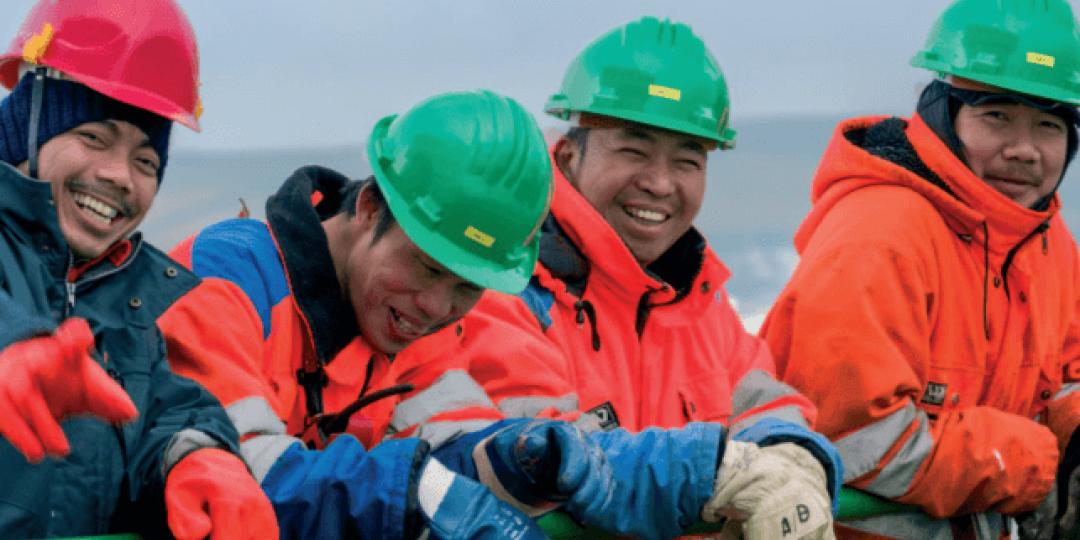Happiness levels are rising among maritime crew, who have expressed their relief at the return to a sense of normality following the disruption of the Covid-19 pandemic, the latest Seafarers Happiness Index Report shows.
Published this week by The Mission to Seafarers, it reveals average seafarer happiness levels in the last quarter of 2022 reached 7.69/10, up from 7.3 in the previous quarter. The survey was undertaken with the support of the Standard Club and Idwal.
The index showed happiness levels were rising across almost all categories, reflecting the sustained upward trend recorded throughout the year. Even the historically most problematic issues, such as shore leave and access to welfare ashore, were recovering.
Crew expressed relief at the return of freedom of movement, as well as their increased sense of certainty and stability. Interestingly, a significant number of seafarers appeared to have switched employer or trading patterns to be closer to home in case of travel restrictions.
The only area in which there was a decline in satisfaction was connectivity. Quality and cost remained concerns and there is a growing demand for free or inexpensive access. Many seafarers believe such access would improve social life at sea, with responses like: “We gathered to watch live World Cup football and the atmosphere on board was fantastic.”
According to the index, happiness steadily rose from its lowest point ever in Q1, with an overall average of 5.85 reflecting the negative impact of the Covid pandemic on seafarers. Other issues such as conflict and contracts also contributed to the low morale and deflated mood among seafarers. Many felt their welfare was not being properly addressed and work conditions were becoming increasingly difficult.
However, in the second quarter there was a significant increase in satisfaction levels, rising from 5.85 to 7.21/10. The third quarter saw further improvement, with the overall average climbing to 7.3/10 due to shore leave improvements, access to welfare facilities, and companies investing in people aboard.
However, persistent issues that need to be tackled include workload, mental health impacts, and the stresses of a difficult job. There were also concerns about the negative impact on mental health of too few people aboard ships.
The index noted that the industry was taking steps towards change, with initiatives such as the Sustainable Shipping Initiative Code of Conduct. Concerns were also raised over the lack of communication with seafarers regarding plans for future fuels training.
Global vessel inspection firm and sponsor of the index, Idwal’s recent inspection results also showed a correlation between the overall condition of a vessel and crew welfare conditions. Analysis of different vessel types, classification societies, and flag states have also supported this trend.
Ben Bailey, director of programme at The Mission to Seafarers, said the mission would continue to highlight the importance of fair treatment, reasonable pay, compassion and understanding in fostering a positive outlook for seafarers. He said there were still complex issues that needed to be confronted such as abandonment, non-payment or delayed payment of wages, and arbitrary immigration decisions.
“We will continue to work closely with shipping companies and managers ashore to shape positive change and to hear more experiences from seafarers through our surveys. We are also mindful of a potential recruitment and retention crisis in 2023 if the trend of seafarers moving from deep-sea to short-sea or inland waterways continues,” Bailey said.
Thom Herbert, Idwal crew welfare advocate and senior marine surveyor, said the research had provided empirical evidence to highlight the interrelationship between better standards of welfare and the quality of ships.
“This combination of sentiment, systems and standards allows for a deeper comprehension of the actions taken, their effects, and the human implications. We believe that this understanding of the value of good welfare, both morally and financially, will be invaluable to the shipping industry,” Herbert said.
Yves Vandenborn, director of loss prevention at Standard Club, said strides had been made against the backdrop of the global pandemic and Russia/ Ukraine conflict.
“It is important to keep up this progress and ensure seafarers’ voices are being heard. There remains a lot that can be done. Standard Club continues to champion seafarer wellbeing and encourage the improvement of working conditions at sea. It is essential to safe and efficient shipping.”













